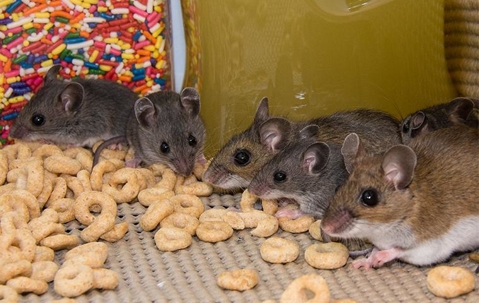House mice, because of their familiarity with us, are especially troublesome pests. Here's how to avoid long-term mouse problems and keep your Buda property safe. From the age when humans were hunter-gatherers and just beginning to put down roots in one location, mice have been in our homes and learning how to depend on us for food and shelter. Their behavior and diets have changed due to human occupation, and they pose unique threats to our households.
How To Identify A House Mouse
House mice, because of their familiarity with us, are especially troublesome pests. They’re smart, dangerous, and quick-breeding, which could create a stressful situation for any homeowner. If you think you may have mice, here’s how you can identify if they are house mice.
House Mice:
- Light brown to dusty gray fur on their backs with cream-colored bellies
- Can grow up to 3 and 3/4 inches long
- Tails - 2 and 3/4 to 4 inches long
- Round body shape
- Pointed muzzles with large ears and small eyes
- Prefer grain-based products but will settle for nearly any kind of human food
- Prefer to nest in dark, secluded areas and make nests using paper, cotton, insulation, and anything else they can find
- Tend only to inhabit a 4-5 foot area
- Leave rod-shaped droppings up to 1/4 of an inch long
- Leave gnaw marks, feet tracks, oily rub marks, or the smell of urine
- Destroy stored food and gnaw through wires and pipes
- These tiny, cute pests may seem harmless, but they are vectors for disease-carrying parasites that spread their own diseases like salmonella and rate-bite fever. Their urine droplets may also worsen asthma, especially in children.
How To Prevent House Mice Infestations
Mice are social creatures. With one dominant male presiding over non-dominant males and a large number of females, there’s no telling how many mice are likely to be in a burrow together. That’s why, if you see a mouse, it’s not just one little mouse. There will be more hiding out than just the one that you’ve seen. If you’d like to prevent an infestation, try these tips.
- Mice can infiltrate through holes the diameter of a pencil. Seal any cracks, holes, or entry points around the outside of your home with silicon-based caulk.
- Keep stored food in sealed containers, preferably metal or glass.
- Keep indoor trash sealed and taken out regularly. Keep outdoor trash properly sealed and away from the home.
- Screen chimneys, crawl spaces, and vents into attics and basements with a 20-mesh screen.
- Install door sweeps on outside doors and make sure windows seal and their screens are well-maintained.
- Keep dark, secluded areas in the home dry and well-ventilated.
- Eliminate any cause for standing or leaking water inside or outside of your home.
- Keep firewood stored at least 20 feet away from the house.
- Keep trees and shrubs trimmed back from windows and roofs, or don’t plant them near such easy entryways.
Rodents of all kinds, but mice especially, can quickly get the run of your home. The best prevention method is enlisting the help of a pest control professional.
White Knight Pest Control Can Keep Your Home Rodent-Free
Not only can regular visits from White Knight keep your home pest-free, but we can also deal with an infestation quickly and thoroughly, so you have peace of mind that they won’t return. In fact, our satisfaction guarantee promises that if you see pests between scheduled visits, we’ll return within one to two days of your call. Call White Knight Pest Control, or visit us online to receive your free estimate.

